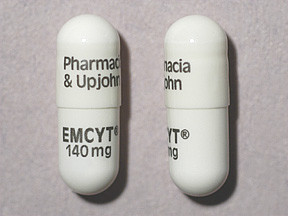ESTRAMUSTINE PHOSPHATE - ORAL
PHONETIC PRONUNCIATION: (ess-TRAM-you-steen FOSS fate)
COMMON BRAND NAME(S): Emcyt
GENERIC NAME(S): estramustine phosphate sodium
Uses
USES: This medication is used to treat some types of prostate cancer. In the body, estramustine breaks down into estrogens (estrone, estradiol) and a type of cancer drug (estromustine). This medication is thought to work by increasing estrogens, which interfere with prostate cancer, and by slowing/stopping the growth of cancer cells.
How to use ESTRAMUSTINE PHOSPHATE - ORAL
HOW TO USE: Take this medication by mouth on an empty stomach, either 1 hour before or 2 hours after a meal, usually 3-4 times a day or as directed by your doctor. Take this medication with a full glass of water (8 ounces or 240 milliliters) unless your doctor directs you otherwise. Take this medication regularly in order to get the most benefit from it. Remember to take it at the same times each day as directed. The dosage is based on your medical condition, weight, and response to therapy. Take this medication 3 hours before or after taking any products containing magnesium, aluminum, or calcium. Some examples include quinapril, didanosine, vitamins/minerals, and antacids. Dairy products (e.g., milk, yogurt), calcium-enriched juice, sucralfate, bismuth subsalicylate, iron, and zinc are also included. These products bind with estramustine, preventing its full absorption. Do not increase your dose or take this medication more often than prescribed. Your condition will not improve any faster, and the risk of serious side effects may be increased. Since this drug can be absorbed through the skin and lungs, women who are pregnant or who may become pregnant should not handle this medication or breathe the dust from the capsules.
Side Effects
Precautions
Interactions
Overdose
Images

- color
- white
- shape
- oblong
- imprint
- PHARMACIA & UPJOHN, EMCYT and logo 140 mg
Reviews
Faq for ESTRAMUSTINE PHOSPHATE - ORAL
Estramustine phosphate is an oral medication that combines two drugs, estradiol (an estrogen hormone) and nitrogen mustard (a chemotherapy drug). It is used primarily in the treatment of prostate cancer.
Estramustine phosphate works by inhibiting the growth of cancer cells. The estrogen component prevents the cancer cells from dividing and multiplying, while the nitrogen mustard component damages their DNA, leading to cell death.
Common side effects of estramustine phosphate include nausea, vomiting, diarrhea, hot flashes, erectile dysfunction, breast enlargement or tenderness, weight gain, and fluid retention.
Estramustine phosphate is usually taken as a capsule, typically once or twice a day. It is important to follow the prescribed dosage and instructions given by your healthcare provider.
If you miss a dose, take it as soon as you remember. However, if it is close to the time for your next dose, skip the missed dose and resume your normal dosing schedule. Do not double the dose to catch up.
Estramustine phosphate is typically not recommended for use in women, as it contains estrogen and can potentially stimulate the growth of certain types of breast cancer.
Certain medications, including blood thinners, antifungal drugs, and some antibiotics, can interact with estramustine phosphate. It is essential to inform your healthcare provider about all the medications you are taking.
The response to estramustine phosphate can vary depending on the individual and the stage of the cancer. It may take weeks or months to see significant improvement in symptoms or slowing down of cancer progression.
Estramustine phosphate is not a curative treatment for prostate cancer but is used to slow down the growth and spread of cancer cells, manage symptoms, and improve quality of life.
Disclaimer
IMPORTANT: HOW TO USE THIS INFORMATION: This is a summary and does NOT have all possible information about this product. This information does not assure that this product is safe, effective, or appropriate for you. This information is not individual medical advice and does not substitute for the advice of your health care professional. Always ask your health care professional for complete information about this product and your specific health needs.
No Reviews Yet